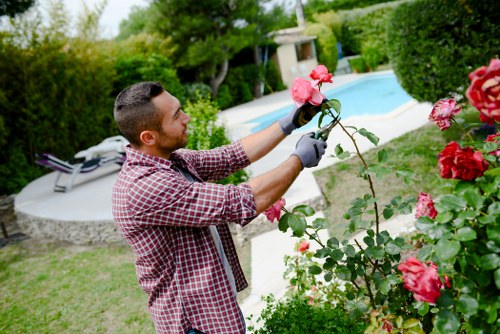Commercial Driveway Restoration in Notting Hill: Transforming Your Business Entrance

In the heart of London, Notting Hill stands out with its vibrant culture and beautiful architecture. For businesses, the first impression often begins with the driveway. A well-maintained driveway not only enhances the aesthetic appeal but also ensures safety and functionality. This article delves into the essentials of commercial driveway restoration in Notting Hill, guiding business owners through the process of revitalizing their entrances.
Over time, commercial driveways endure wear and tear from heavy traffic, weather conditions, and regular use. Cracks, potholes, and surface deterioration can negatively impact your business’s image and customer experience. Restoring your driveway is a crucial investment that can lead to long-term benefits.
Understanding the unique challenges faced in Notting Hill is essential. The area's historical significance and bustling commercial activity require driveway restoration solutions that are both effective and respectful of the local environment.
Why Restore Your Commercial Driveway?

Restoring a commercial driveway goes beyond mere appearance. Here are some key reasons why businesses in Notting Hill should consider driveway restoration:
- Enhanced Curb Appeal: A visually appealing driveway attracts more customers and creates a positive first impression.
- Safety: Fixing cracks and potholes reduces the risk of accidents, ensuring the safety of customers and employees.
- Durability: Restoration increases the lifespan of your driveway, saving costs on frequent repairs.
- Compliance: Ensure your driveway meets local regulations and safety standards.
Investing in driveway restoration is a proactive approach to maintaining your business’s reputation and operational efficiency.
Moreover, a well-restored driveway can improve drainage and reduce water pooling, which is particularly important in areas with heavy rainfall like Notting Hill.
Next, let’s explore the restoration process in detail.
The Driveway Restoration Process

Successful commercial driveway restoration involves several steps, each critical to achieving a lasting result. Here’s a comprehensive overview:
1. Assessment and Planning
The first step involves a thorough assessment of the current driveway condition. Experts examine the extent of damage, identify underlying issues, and determine the appropriate restoration method.
2. Cleaning and Preparation
Before any restoration work begins, the driveway must be cleaned to remove debris, oil stains, and other contaminants. This ensures that the restoration materials adhere properly.
3. Crack Repair and Pothole Filling
Cracks and potholes are repaired using high-quality fillers that prevent further deterioration. This step is vital for maintaining the structural integrity of the driveway.
4. Resurfacing
Resurfacing provides a fresh layer over the existing driveway, enhancing its appearance and durability. Options include asphalt overlays, concrete resurfacing, and more.
5. Sealing and Finishing
Sealing protects the driveway from environmental elements and future wear. It also gives the driveway a polished look, boosting its curb appeal.
Choosing the Right Materials

The materials used in driveway restoration significantly impact the outcome. Here are some commonly used options in Notting Hill:
- Asphalt: Known for its durability and cost-effectiveness, asphalt is a popular choice for commercial driveways.
- Concrete: Offers a clean and professional appearance, with options for decorative finishes.
- Resin Bound: Provides a permeable surface that allows water drainage, reducing puddling and enhancing sustainability.
- Gravel: An affordable option, though it requires regular maintenance.
Selecting the right material depends on your budget, aesthetic preferences, and functional requirements.
Professional contractors in Notting Hill can help you choose the best material suited to your specific needs.
Let’s now look at the cost factors involved in driveway restoration.
Cost of Commercial Driveway Restoration

Understanding the cost factors is crucial for budgeting your driveway restoration project. Several elements influence the overall expense:
- Size of the Driveway: Larger driveways require more materials and labor, increasing costs.
- Extent of Damage: Extensive repairs, such as deep potholes or widespread cracks, can raise the price.
- Chosen Materials: High-end materials like decorative concrete or resin-bound surfaces are more expensive than standard asphalt.
- Labor Costs: Skilled labor in Notting Hill may command higher rates.
- Additional Features: Incorporating features like lighting or decorative borders can add to the cost.
On average, commercial driveway restoration in Notting Hill can range from £50 to £100 per square meter, depending on the factors mentioned above.
It’s advisable to obtain quotes from multiple contractors to ensure competitive pricing.
Next, we will discuss the benefits of hiring local experts for your restoration project.
Benefits of Hiring Local Experts
Choosing a local restoration company in Notting Hill offers several advantages:
- Local Knowledge: Understanding the specific climate and soil conditions in Notting Hill ensures effective restoration techniques.
- Reputation: Local businesses often rely on word-of-mouth, ensuring high-quality service and reliability.
- Quick Response: Proximity allows for faster project initiation and completion.
- Compliance: Local experts are well-versed in local regulations and can ensure your driveway meets all legal requirements.
Investing in local services supports the community and fosters long-term relationships with service providers.
Now, let’s explore maintenance tips to preserve your restored driveway.
Driveway Maintenance Tips
Proper maintenance extends the lifespan of your commercial driveway and keeps it looking pristine. Here are some essential maintenance tips:
- Regular Cleaning: Remove debris, oil spills, and stains promptly to prevent permanent damage.
- Sealant Application: Apply sealant every few years to protect the surface from weather and traffic.
- Prompt Repairs: Address cracks and potholes immediately to avoid worsening damage.
- Proper Drainage: Ensure that water drains away from the driveway to prevent pooling and erosion.
- Traffic Management: Limit heavy vehicles on the driveway to reduce stress and wear.
Implementing these practices can help maintain the integrity and appearance of your driveway for years to come.
Next, we will highlight some local success stories in Notting Hill.
Local Success Stories
Many businesses in Notting Hill have benefited from professional driveway restoration. For instance, a local café saw a significant increase in foot traffic after revamping its entrance with a stylish resin-bound driveway. Another office building reduced maintenance costs by switching to durable concrete surfaces.
These success stories highlight the tangible benefits of investing in driveway restoration, from improved aesthetics to operational savings.
Finally, let’s look at the nearest areas to Notting Hill that also benefit from these services.
Nearby Areas Offering Driveway Restoration
If you're located in Notting Hill or nearby, you have access to several areas offering specialized commercial driveway restoration services:
- Holland Park: Just south of Notting Hill, known for its affluent businesses.
- Kensington: Offers a mix of residential and commercial restoration solutions.
- Chalk Farm: A vibrant area with unique business needs.
- Maida Vale: Known for its wide avenues and professional services.
- North Kensington: Provides versatile restoration options for diverse businesses.
- Little Venice: Scenic area requiring aesthetically pleasing driveways.
- Royal Borough of Kensington and Chelsea: Strict regulations ensure high-quality restoration standards.
- Palace Gate: Exclusive area with premium restoration services.
- Barbican: Central location with access to top restoration experts.
- Ladbroke Grove: Known for its dynamic business environment.
- Westbourne Grove: Offers trendy and modern driveway solutions.
- Notting Hill Gate: High-traffic area requiring durable restoration methods.
- Shepherd’s Bush: Industrial and commercial blend suitable for various driveway types.
- Queen’s Gate: Prestigious area with specialized restoration needs.
- Ealing: Extending your reach beyond central Notting Hill.
Conclusion
Commercial driveway restoration in Notting Hill is a strategic investment that enhances your business’s image, safety, and functionality. By understanding the restoration process, choosing the right materials, and maintaining your driveway, you ensure lasting benefits for your enterprise.
Partnering with local experts guarantees tailored solutions that respect the unique character of Notting Hill and its surrounding areas. Whether you're in Holland Park or Little Venice, quality driveway restoration services can transform your business entrance into a welcoming and professional space.
Frequently Asked Questions
1. How long does driveway restoration take for a commercial property?
The duration varies based on the size and condition of the driveway, but typically, restoration can be completed within a few days to a couple of weeks.
2. What is the best material for a commercial driveway in Notting Hill?
Asphalt and concrete are popular choices due to their durability and reliability, but resin-bound surfaces are also favored for their aesthetic appeal and permeability.
3. How often should a commercial driveway be restored?
Generally, a driveway should be restored every 10-15 years, depending on usage and maintenance practices. Regular inspections can help determine the optimal timing.
4. Can driveway restoration improve drainage?
Yes, proper restoration includes improving drainage systems to prevent water pooling and related damage.
5. Are there any regulations for commercial driveway restoration in Notting Hill?
Yes, local regulations may dictate specific standards for materials and drainage. It’s important to work with local experts who are familiar with these requirements.


